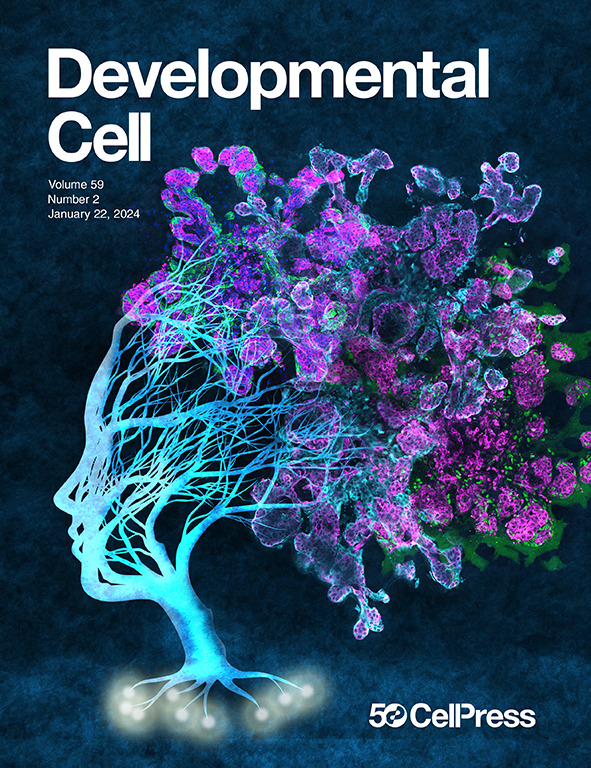表达bmi1的小鼠肠道干细胞的双重状态利用非规范Wnt信号驱动上皮发育
IF 10.7
1区 生物学
Q1 CELL BIOLOGY
引用次数: 0
摘要
肠上皮的发育和稳态严重依赖于平衡的干细胞增殖,包括慢循环/标签保留和活跃循环/典型wnt依赖性肠干细胞(ISC)亚型。发育过程中ISC的调控仍然知之甚少,但对于建立控制组织维持的关键机制具有重要意义。在此,我们发现Bmi1+细胞是早期小鼠肠道发育中存在的功能性干细胞,早于表达lgr5的ISCs。谱系追踪和单细胞RNA测序发现Bmi1+ ISCs可以追溯到Lgr5+ ISCs和其他分化谱系。Bmi1+ ISCs最初是高度增殖的,随着Lgr5+ ISCs的出现,Bmi1+ ISCs转变为慢循环状态。非典型Wnt信号调节增殖的Bmi1+细胞状态。这些发现强调了干细胞群和控制增殖的相反Wnt通路之间的动态相互作用,最终对组织发育、体内平衡、再生和肿瘤发生具有影响。了解这些基本的发育机制对于理解成人肠道维持至关重要。本文章由计算机程序翻译,如有差异,请以英文原文为准。

Dual states of murine Bmi1-expressing intestinal stem cells drive epithelial development utilizing non-canonical Wnt signaling
Intestinal epithelial development and homeostasis critically rely upon balanced stem cell proliferation, involving slow-cycling/label-retaining and active-cycling/canonical Wnt-dependent intestinal stem cell (ISC) subtypes. ISC regulation during development remains poorly understood but has important implications for establishing key mechanisms governing tissue maintenance. Herein, we identify Bmi1+ cells as functional stem cells present in early murine intestinal development, prior to Lgr5-expressing ISCs. Lineage tracing and single-cell RNA sequencing identify that Bmi1+ ISCs can trace to Lgr5+ ISCs and other differentiated lineages. Initially highly proliferative, Bmi1+ ISCs transition to slow-cycling states as Lgr5+ ISCs emerge. Non-canonical Wnt signaling regulates the proliferative Bmi1+ cell state. These findings highlight the dynamic interplay between stem cell populations and the opposing Wnt pathways that govern proliferation—ultimately having implications for tissue development, homeostasis, regeneration, and tumorigenesis. Understanding these fundamental developmental mechanisms is critical for understanding adult intestinal maintenance.
求助全文
通过发布文献求助,成功后即可免费获取论文全文。
去求助
来源期刊

Developmental cell
生物-发育生物学
CiteScore
18.90
自引率
1.70%
发文量
203
审稿时长
3-6 weeks
期刊介绍:
Developmental Cell, established in 2001, is a comprehensive journal that explores a wide range of topics in cell and developmental biology. Our publication encompasses work across various disciplines within biology, with a particular emphasis on investigating the intersections between cell biology, developmental biology, and other related fields. Our primary objective is to present research conducted through a cell biological perspective, addressing the essential mechanisms governing cell function, cellular interactions, and responses to the environment. Moreover, we focus on understanding the collective behavior of cells, culminating in the formation of tissues, organs, and whole organisms, while also investigating the consequences of any malfunctions in these intricate processes.
 求助内容:
求助内容: 应助结果提醒方式:
应助结果提醒方式:


